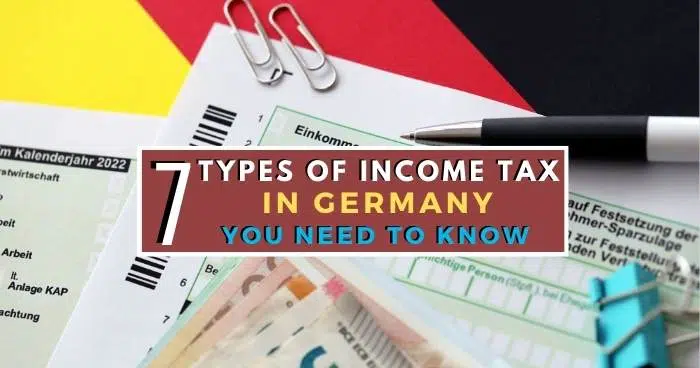The income tax in Germany is part of the salary tax in case you are not self-employed or a business owner. You will learn in this article that income tax applies to your salary and a few other income sources. To give you the best explanation possible, I included some real-life examples.
Key takeaways
- First, I will explain to you what income tax in Germany is and how it is calculated. Depending on the income, the tax rate changes.
- Furthermore, you will learn which different incomes are taxed with which tax rate. In addition to the income tax as part of the income tax, other types of income are to be taxed. These include trade tax, tax on capital gains, and more.
- In addition, income from pension payments, rentals, leasing of agricultural land, and others is taxed. Since the income tax return in Germany must typically be filed annually, it is essential to know which expenses can be deducted.
- You’ll also learn which three income tax return options are typically used.
- Finally, I will address the question of what happens if you forget to file your income tax return in Germany on time.
- You will also learn what other types of taxes you should know about.
In this article:
What is income tax in Germany >>
Rates for income tax >>
Income subject to tax in Germany >>
Expenses deducted from tax in Germany >>
How to file the tax return >>
What if I don’t declare the income >>
Other taxes in Germany >>
What is income tax in Germany?
Income tax in Germany is a progressive tax deducted from your gross income. The rates start at 14% and rise incrementally to 45%, while the top rate is for those with very high earnings. In comparison to other European countries, Germany comes in the 16th place based on the information on taxsummaries.pwc.com.
The top personal income tax rates in Europe do look like this:
| European OECD Country | Top Statutory Personal Income Tax Rate |
| Denmark (DK) | 55.90% |
| France (FR) | 55.40% |
| Austria (AT) | 55.00% |
| Greece (GR) | 54.00% |
| Spain (ES), Valencia | 54.00% |
| Belgium (BE) | 53.50% |
| Portugal (PT) | 53.00% |
| Sweden (SE) | 52.30% |
| Finland (FI) | 51.20% |
| Slovenia (SI) | 50.00% |
| Netherlands (NL) | 49.50% |
| Ireland (IE) | 48.00% |
| Italy (IT) | 47.20% |
| Iceland (IS) | 46.20% |
| Luxembourg (LU) | 45.80% |
| Germany (DE) | 45.00% |
| United Kingdom (GB) | 45.00% |
| Switzerland (CH) | 44.80% |
| Turkey (TR) | 40.80% |
| Norway (NO) | 39.40% |
| Poland (PL) | 36.00% |
| Lithuania (LT) | 32.00% |
| Latvia (LV) | 31.00% |
| Slovakia (SK) | 25.00% |
| Czech Republic (CZ) | 23.00% |
| Estonia (EE) | 20.00% |
| Hungary (HU) | 15.00% |
Each citizen in Germany must register for income tax by the end of July of the following year. So, the income tax declaration for 2022 is due between January 2023 and 31. July 2023. Since COVID, these dispensing periods have changed somewhat.
Any exemptions due to pandemic?
So, the Fourth Corona Tax Relief Act gives you more time to file your 2021 tax return, until October 31, 2022. If an income tax assistance association (Lohnsteuerhilfeverein) or a tax consultant (Steuerberater) helps with the tax return, they can extend the submission deadline to August 31, 2023.
What are the rates for income tax in Germany?
If you take a closer look at the income tax rates for Germany in 2022, the staggering looks like this, according to an article on Wikipedia.
| Yearly gross income (from – to in Euro) | Income Tax Rate |
| 0 – 10,347 | 0% |
| 10,348 – 14,926 | 14% |
| 14,927 – 58,596 | 23.97% |
| 58,597 – 277,825 | 42% |
| 277,826 and above | 45% |
While the tax rates themselves do not change, the yearly gross income that they are applied to may vary.
These are the 7 types of income subject to tax in Germany
Understanding the income tax rate in Germany is one thing. The other one is getting to know more about the income subject to tax in Germany. According to the information from the federal ministry of finance (Bundesfinanzministerium), the German state taxes seven different income categories.
However, they do not treat all types of income equally.
1. Income tax in Germany from employment or self-employment
The most obvious one is the income tax in Germany on employment or self-employment. I talked to one of my neighbors in Germany as he started his career as an apprentice. He then went through almost all income tax rates so far.
In the first year of his apprenticeship, he earned 10,200 Euros per year, so he did not have to pay any income tax yet. In his third year, earning 1,150 Euro per month, he had to pay 14% of the 13,800 Euro yearly salary. A few years later, earning 55,000 Euros in a year, he must pay 23,97% income tax on his salary.
If you want to know more about the actual deductions of your salary, I recommend you use my salary calculator. Income tax is only part of the taxes you have to pay, because there are other deductions from your gross salary. You still have to pay for things like health insurance and others.
You have to understand that there is a difference between income tax in Germany and salary tax. The salary tax consists of income tax, church tax, and more, as you can learn in my article about the salary calculator provided here.
2. Business taxes in Germany
Business taxes in Germany are essential to keep an eye on when working as a freelancer or opening your own business. You have to pay income tax and VAT (Umsatzsteuer or USt in German) if you are self-employed.
Even if it’s a bit more effort, I recommend charging VAT on your invoices from my own experience. The VAT currently is at 19%. I want to give you a quick example of how you can benefit from charging VAT, as it allows you to deduct the VAT from any business-related expenses.
Imagine a web developer and a client signing a contract with you for a new website. The net charge is 10,000 Euros. The invoice you are sending to the client includes 19% VAT, so the client has to pay you 11,900 Euro.
If you do not have any business-related expenses, you must pay the Finanzamt (tax office) 1,900 Euro VAT. At the end of the year, when filing your income tax declaration, you will have to pay income tax on all your net income.
The calculation looks a bit different when you had net business-related expenses of, for example, 380 Euros. As a result, you only have to pay 1,520 euros instead of the 1,900 euros.
You will have to add at least an Einnahmenüberschussrechnung (EÜR) in English excess income statement to your tax declaration as a freelancer. This EÜR must list all income and expenses in detail.
3. Income tax from capital assets
Income tax is also to be paid from capital assets. If you have a small depot and made some transactions on a stock exchange, you might have to pay income tax on your wins. A bank usually manages capital assets or Kapitalerträge in Germany.
Banks must automatically retain a 25% final withholding tax. If your earnings through savings or other capital assets are less than 801 Euro for singles or 1,602 Euro for married couples, you can use the Freistellungsauftrag (exemption order) so that you won’t have to pay any taxes.
If your wins through any financial assets are more significant, banks automatically keep that 25% from every earning above 801 or 1,602 Euros. § 20 EStG handles all income tax regulations from capital assets.
4. Taxation of income from rent and lease in Germany
In Germany, all income from rent and lease is subject to paying income tax.
A friend of mine owns two apartments and rents those out to tenants. He gets about 3,000 Euros in rent from both apartments. In a year, this friend earns an additional 36,000 Euros. That amount adds to his regular income in his yearly income tax statement.
You can find more detailed information in § 21 Einkommenssteuergesetz.
Depending on the overall income, he must pay income tax for this rental income.
5. Income tax in Germany from pensions
A friend of mine receives a state pension after quitting work at 65. The same rule does apply when you receive a pension from a former company. You must account for a pension as income from employment.
Based on the information of haufe.de you have a Versorgungsfreibetrag or pension allowance dependent on the year you retire. In general, you have to pay total income tax in Germany on any kind of pension.
6. Taxation of income from agriculture and forestry
Here is another example of a neighbor of mine who inherited a small agricultural land and is now worried about his taxes. In your Einkommenssteuererklärung or income tax declaration, one part is related to agriculture income.
My neighbor leases his small land to a full-time farmer and receives rent. The German state taxes this form of income in the same way as income from renting and leasing. The taxation is described in §§ 13–14a EStG – Einkommenssteuergesetz.
7. Income tax in Germany from other types of income
Section 22 of the German Income Tax Act is not a catch-all provision covering all other income. If income is not attributable to any other type of income, it may be included in the so-called “income from other benefits”.
However, this provision is interpreted very narrowly. Income from other services includes, for example, income from occasional brokerage and income from the rental of movable property.
An example would be that you own a motor home, and you rent this out a few times during the year to people you know for a small sum. In your tax declaration, all earnings would have to be listed under “Einkünfte aus sonstigen Leistungen” in your tax declaration.
The same tax rates as for the income tax in Germany apply to those other types of income.
What expenses can be deducted from tax in Germany?
Here is a list of some everyday expenses that can be deducted from income tax in Germany:
- Home office used for professional purposes
- Domestic help
- Gardeners and other artisans’ expenses
- Child care (up to 4,000 Euro per child)
- Renovation costs
- Job-related travel expenses
- Moving expenses
- Pension savings plans
- Tax consultancy costs or price of tax software
You can learn more about those tax deductions in my article here.
How to file the tax return in Germany (Steuererklärung)?
Income tax returns in Germany can nowadays be filed entirely online. There are three common ways to do that. Let me start with my favorite – using an income tax calculator such as SteuerGo or other providers.
Use an income tax calculator such as SteuerGo
In order to calculate you income tax, you can use the SteuerGo* income tax calculator
SteuerGo helps you file your income tax return by leading you through the whole process by asking you questions. Or you may connect to your official tax return account called ELSTER in Germany and start from there.
The whole process is easy to follow, and you get your tax statements ready in a short amount of time. As soon as you are finished, you only have to pay a one-time fee to SteuerGo* to get everything submitted directly to the official tax office called Finanzamt.
Ask a financial advisor
The other option is to consult a financial advisor called Steuerberater in Germany. They usually have fixed rates for filing your income tax in Germany. The amount of time that goes into that process is way more from my experience and only makes sense if you have several income sources.
You have to prepare all income and expense-related documents beforehand and hand over a folder with everything inside to the tax consultant. They will file your income tax declaration in Germany on your behalf and work with the tax office if they have any questions.
Complete your tax return in Germany ALONE
The other option is to file your tax return in Germany. The cheapest way is to use the ELSTER platform, which is the official platform of the tax office in Germany. ELSTER will provide you with several forms that you need to fill out independently.
The disadvantage of that solution is that the ELSTER platform does not provide you with tips on how to save taxes. SteuerGo and other solutions do that very well, on the other hand. So from my experience, using the ELSTER form is the least favorable way to file your income tax in Germany.
What happens if I don’t declare the income subject to income tax in Germany?
Everyone who lives in Germany has to declare income tax in Germany with one exception. If your yearly income is below the 9,744 Euros for singles or 19,488 Euros for couples, you don’t have to file income tax.
If you forgot to declare your income tax, you would get charged with a so-called Verspätungszuschlag or a late payment surcharge. According to the German Tax Code, a penalty for late filing can be assessed if the tax return is not filed or is filed late.
A maximum of 10 percent of the assessed tax is due as a penalty, but no more than 25,000 euros.
What other taxes in Germany should you know about?
Except for VAT (19% for everything, except for groceries and books, which are taxed at 7%) and the income tax in Germany, there are a few more taxes you should be aware of.
Lohnsteuer or salary tax
All employers are obliged to withhold salary tax from the salary or wages of their employees. They automatically pay it to the tax office. The salary tax includes, amongst others, the church tax and the income tax.
Kirchensteuer or church tax
You pay this tax only if you are a Catholic or Protestant Church member. It is calculated based on the income tax paid. The value varies depending on the state and can be up to 9%.
Umsatzsteuer (MwSt.) or VAT
Certain goods such as beer, spirits, coffee, and tobacco products have different tax rates. You do not notice this as a consumer because it is not specially marked. You usually pay only the 7% or 19% VAT as an end customer.
Conclusion
Now that you have learned how much income is taxed in Germany in my article, I would like to give you a final tip. Some types of income are not automatically taxed immediately but only with the income tax return. Everything else but income from your salary will be taxed in the following year.
For this reason, I recommend that you always set aside some money to be able to make any additional payments to the tax office. This way, you avoid not being able to service claims from the tax office.
USEFUL INFORMATION ABOUT GERMANY
JOBS IN GERMANY
> How To Get A Job In Germany
___
INSURANCE IN GERMANY
> 15 types of insurance in Germany any expat should have
___
FINANCES IN GERMANY
> Find Best Rates for Loan in Germany
___
WAGES AND TAXES IN GERMANY
> Tax return Germany – Everything you need to know
> Average Salary in Germany Latest Data
___
WORKING IN GERMANY
> CV in German with Europass: How to fill in step by step
___
LEARNING GERMAN LANGUAGE
> How to learn German fast: Top 10 strategies
* The links that are marked in this way are affiliate links and indicate that we receive a small commission if you decide to buy the products or services offered by our partner sites. But for you, it won’t cost anything extra.









